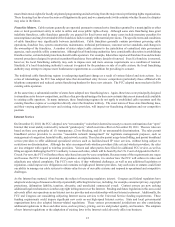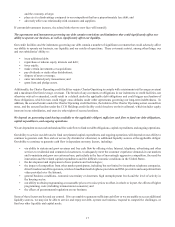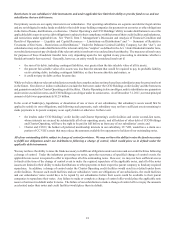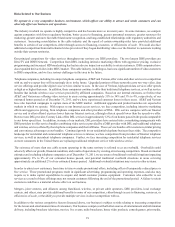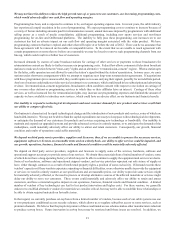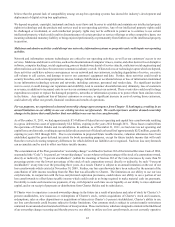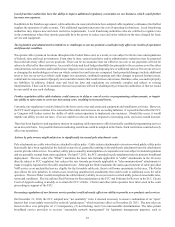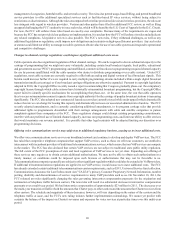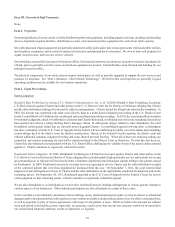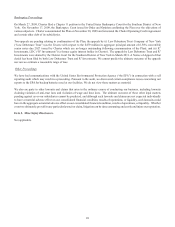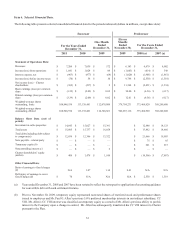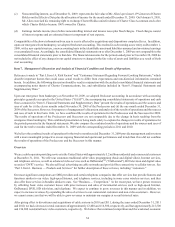Charter 2011 Annual Report Download - page 36
Download and view the complete annual report
Please find page 36 of the 2011 Charter annual report below. You can navigate through the pages in the report by either clicking on the pages listed below, or by using the keyword search tool below to find specific information within the annual report.24
• other requirements covering a variety of operational areas such as equal employment opportunity, emergency alert systems,
technical standards, and customer service requirements.
Additionally, many aspects of these regulations are currently the subject of judicial proceedings and administrative or legislative
proposals. In March 2010, the FCC submitted its National Broadband Plan to Congress and announced its intention to initiate
approximately 40 rulemakings addressing a host of issues related to the delivery of broadband services, including video, data,
VoIP and other services. The broad reach of these rulemakings could ultimately impact the environment in which we operate.
There are also ongoing efforts to amend or expand the federal, state, and local regulation of some of our cable systems, which may
compound the regulatory risks we already face, and proposals that might make it easier for our employees to unionize. For example,
Congress and various federal agencies are now considering adoption of significant new privacy restrictions, including new
restrictions on the use of personal and profiling information for behavioral advertising. In response to recent global data breaches,
malicious activity and cyber threats, as well as the general increasing concerns regarding the protection of consumers’ personal
information, Congress is considering the adoption of new data security and cybersecurity legislation that could result in additional
network and information security requirements for our business. In the event of a data breach or cyber attack, these new laws, as
well as existing legal and regulatory obligations, could require significant expenditures to remedy any such breach or attack. In
addition, the Twenty-First Century Communications and Video Accessibility Act of 2010 includes various provisions intended to
ensure communications services are accessible to people with disabilities.
Our cable system franchises are subject to non-renewal or termination. The failure to renew a franchise in one or more key
markets could adversely affect our business.
Our cable systems generally operate pursuant to franchises, permits, and similar authorizations issued by a state or local
governmental authority controlling the public rights-of-way. Many franchises establish comprehensive facilities and service
requirements, as well as specific customer service standards and monetary penalties for non-compliance. In many cases, franchises
are terminable if the franchisee fails to comply with significant provisions set forth in the franchise agreement governing system
operations. Franchises are generally granted for fixed terms and must be periodically renewed. Franchising authorities may resist
granting a renewal if either past performance or the prospective operating proposal is considered inadequate. Franchise authorities
often demand concessions or other commitments as a condition to renewal. In some instances, local franchises have not been
renewed at expiration, and we have operated and are operating under either temporary operating agreements or without a franchise
while negotiating renewal terms with the local franchising authorities.
The traditional cable franchising regime is currently undergoing significant change as a result of various federal and state actions.
Some of the new state franchising laws do not allow us to immediately opt into favorable statewide franchising. In many cases,
state franchising laws will result in fewer franchise imposed requirements for our competitors who are new entrants than for us,
until we are able to opt into the applicable state franchise.
We cannot assure you that we will be able to comply with all significant provisions of our franchise agreements and certain of our
franchisors have from time to time alleged that we have not complied with these agreements. Additionally, although historically
we have renewed our franchises without incurring significant costs, we cannot assure you that we will be able to renew, or to renew
as favorably, our franchises in the future. A termination of or a sustained failure to renew a franchise in one or more key markets
could adversely affect our business in the affected geographic area.
Our cable system franchises are non-exclusive. Accordingly, local and state franchising authorities can grant additional
franchises and create competition in market areas where none existed previously, resulting in overbuilds, which could adversely
affect results of operations.
Our cable system franchises are non-exclusive. Consequently, local and state franchising authorities can grant additional franchises
to competitors in the same geographic area or operate their own cable systems. In some cases, local government entities and
municipal utilities may legally compete with us without obtaining a franchise from the local franchising authority. In addition,
certain telephone companies are seeking authority to operate in communities without first obtaining a local franchise. As a result,
competing operators may build systems in areas in which we hold franchises.
In a series of rulemakings, the FCC adopted new rules that streamline entry for new competitors (particularly those affiliated with
telephone companies) and reduce franchising burdens for these new entrants. At the same time, a substantial number of states
have adopted new franchising laws. principally designed to streamline entry for new competitors, and often provide advantages
for these new entrants that are not immediately available to existing operators.



